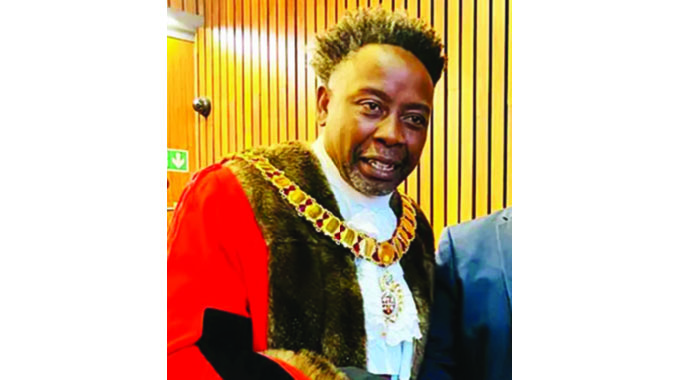Student raises Zim flag abroad

Tafadzwa Zimoyo Senior Arts Writer
Man has been known to be a traveller, wanderer and adventurer since the beginning of time, as a response to challenges in the home space, the desire to feed the family, and other personal considerations.
Hunting in foreign lands in times of natural and man-made disasters has always helped man to provide for the family, and improve the home space for fellow kinsmen.
Hence, the Diaspora as it is known today is not a surprising or new phenomenon; and like that of yore, it still has benefits that can go a long way in improving the home space.
Before and after Independence in 1980, many Zimbabweans were drawn to the Diaspora in pursuit of education; Western education that is, and opportunities to improve their lifestyles, and those of loved ones back home.
Some moved to the Diaspora as refugees, running away from the oppressive system set-up by the racist Ian Smith regime.
Those who had gone to pursue educational opportunities before independence came back to contribute to the Homeland as bureaucrats, captains of industry, teachers, doctors as well as other professions, which all helped in mapping the destiny of the new Republic of Zimbabwe.
The Diaspora did not lose its lustre at independence, as Zimbabweans still go abroad to pursue studies on scholarships, and to seek job and professional opportunities. Because home will always be home, many of them will either come back, or send remittances, thus, contributing to the development of the Motherland.
One such Zimbabwean, who has decided to put his mind to the welfare of his fellow countrymen is Vincent Bodzo (27), who grew up in Harare.
Because his heart was in the social sciences, Bodzo enrolled for a Bachelor in Social Work Honours Degree with the University of Pretoria (2014-2017), after completing his secondary education at St Antony’s High School in Masvingo. The journey to social entrepreneurship competence saw him joining ENACTUS in his third year of tertiary education before moving on to PaNhari, a non-governmental organisation based in Washington DC, United States, whose main thrust is to address youth unemployment in Zimbabwe and South Africa.
Now based in the United Kingdom where he has been reading for a Master’s in Public Health at Nottingham Trent University on scholarship since last year, Bodzo opened up to The Herald in an interview about his dreams on the welfare of his fellow countrymen, and the journey he has thus far undertaken.
“My master’s degree programme has a framework that is mainly centred on the social model of health that works in conjunction with the biomedical model,” Bodzo said.
“My desire to become a Public Health Practitioner and become part of the solution to the challenges afflicting our nation was fuelled by lived experiences, because I grew up in Zimbabwe. The socio-economic and socio-political challenges facing our country, leading to massive brain drain need to be addressed, hence, the desire to contribute.
“The emerging global health challenges in the 21st century compounded by the socio-economic and political environment that we are living in, needless to say, require high technical expertise if we are to keep in pace, and be able to address public health challenges. This opened up valuable ideas for me to want to pursue Public Health Entrepreneurship projects in Zimbabwe.”
Bodzo received an Erasmus plus mobility scholarship that allowed him to gain three months’ field experience in Uganda, focusing on Cardiovascular Diseases and Antimicrobial Resistance projects. Antimicrobial Resistance is when microorganisms such as bacteria, viruses, fungi and parasites change in ways that render the medications used to cure the infections they cause ineffective.
Antimicrobials such as antibiotics, antivirals and antimalarial medicines become ineffective in the treatment of infections. The microorganisms survive attempts to eliminate it and continue to multiply, causing more harm and even death.
“I was taken on board the Nottingham Trent University and Makerere University School of Public Health Antimicrobial Stewardship partnership that received funding from the Tropical Health and Education Trust in the United Kingdom to carry out presentations and projects in Uganda,” said Bonzo.
“My role was to aid research on preventative measures to tackle antimicrobial resistance in sub-Saharan Africa. My desire is to start public health entrepreneurship projects in Zimbabwe. The whole plan is to scale up the PaNhari enterprise, so that we can make a bigger social impact on the socio-economic and health spectrum in our country.”
This enterprise is going to focus mainly on health promotion, disease prevention and healthcare services by analysing the social determinants of health in Zimbabwe, and mitigating them through opportunistic creation and implementation of catalytic innovations that intend to offer a sustained improvement in health matters. Zimbabwe needs to pursue self-sustaining solutions to public health challenges, which are lacking due to economic instability.
Now, with the burden of diseases such as HIV, TB, malaria, cholera, diabetes, cancer and new global epidemics like antimicrobial resistance, health services providers are capitalising by charging exorbitant prices. This has ultimately led both rural and urban dwellers to resort to unconventional and dangerous ways of treatment.
Bodzo has a solution to this: “I want to be able to create and implement action-centric projects that offer affordable, easily accessible and high quality services with the view to preserve life and curb the spread of preventable diseases. Through lived experiences, I have observed my relatives and people around me complaining of inflated healthcare prices, and ultimately losing their lives; which has inspired me to do something for them.
“I also want to invest in health research using the social model to assist in generating preventative and curative measures to tackle the significant health issues mentioned above.
“Nottingham Trent awarded me a travel scholarship to Geneva, Switzerland where I will be able to network and interact with different stakeholders on the World Health Forum, and present my action plan as well as gain more experience on how to blend business models with solutions to health related problems.”
Studying abroad has exposed Bodzo to the benefits of inter-cultural development, giving him the competence to be more respectful towards the world’s welfare. However, studying abroad was not all sails for Bodzo, as he faced challenges, chief among them being financial constraints.
“The financial pressure and cultural shock that the system puts on you, pushes you to do more,” he said.
“Surviving out there requires endurance both mentally and physically. I managed to find healthy distractions such as reading novels and making local friends. I realised that we all have an inherent power to either change the things that we don’t like or find ways to live with them.”









Comments